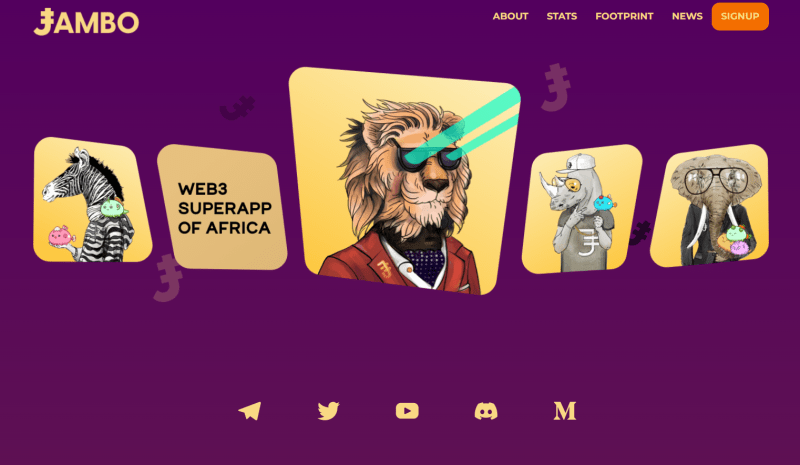Congo-based startup Jambo raises $7.5M in seed round
- Posted on February 22, 2022
- Technology
- By Glory

Jambo, a Congo-based startup and strong advocate for
Web3 in Africa has acquired $7.5 million in seed funding. The round was led by
well-known cryptocurrency investors, including Delphi Ventures, Coinbase
Ventures, and Three Arrows Capital.
According to experts, Africa is set to be disrupted by
Web3 in the same way that Southeast Asia has become one of the best markets for
web3. Due to the acceptance of crypto and play-to-earn models, firms like as
Axie Infinity and Yield Guild Games have raised millions of dollars in venture
financing.
Africa is the next focus for web3 due to a combination
of pros such as a fast-growing population, rapid smartphone penetration,
increasing crypto usage, and disadvantages such as low GDP per capita across
the board and unemployment. Due to this fact a few businesses, such as Jambo,
are preparing for the next wave of growth, according to TechCrunch.
According to the World Economic Forum, Africa's crypto
market rose by over $100 billion between July 2020 and June 2021, equating to a
1,200 percent increase in value.
Through play-to-earn gaming and decentralized finance
(DeFi) services such as currency exchanges and remittances, Jambo hopes to introduce
young Africans to Web 3 financial ecosystems.
The startup plans to enroll millions of users to web3
across Africa through its applications, the company's co-founder and CEO James
Zhang said. After realizing the chance to replicate the success of web3
initiatives in Southeast Asia across Africa, he started the company alongside
his sister, both Congo-born Chinese, in November 2021.
Zhang was born and raised in the Democratic Republic
of Congo, and his family has lived in Africa for three generations, according
to him. He worked for four years as a crypto fund manager after graduating from
NYU in 2017 with a degree in computer technology.
Although users other guilds receive money just when
they play games, Jambo takes a two-pronged strategy by allowing them to earn
money when they participate in web2 and web3 activities. Jambo users can save
money on data.
There are currently no well-known play-to-earn web3
games from Africa, owing to a lack of infrastructure for creating such through guilds.
Jambo, according to Zhang, wants to construct such infrastructure. Despite
this, unlike well-known guilds that collect a percentage of profits from its
members, his company has no plans to take a cut from its members' revenues.
Instead, Jambo's revenue would come from web2 models, which would charge
advertising dollars as well as commissions from airtime and data sales.
According to Zhang, Jambo works with telecom carriers
to obtain a nearly 70% discount, which it then sells straight to its
subscribers at a 50% discount. "It's one of our primary user acquisition
techniques," Zhang explained, "where we aim to quadruple every
African's airtime and data."
“The reason we can do that is via partnerships with
these companies as we tokenize a part of their advertising budget and directly
provide to the end-user,” he said. “Many web2 incumbents or even web3 are
having a $100-200 user acquisition costs so we can lower that by order of
magnitude by directly incentivizing the end-user.”
Jambo's main goal, according to Zhang, is to teach
young Africans about Web 3 and introduce them to the money opportunities it
provides. University students are one of Jambo's intended user groups.
According to the African Center for Economic Transformation, over 50% of
university graduates in Africa were unemployed in 2019.
Since January, Jambo has enrolled over 12,000 children
from 15 African countries, including the Democratic Republic of Congo, South
Africa, Nigeria, and Ethiopia, in a Web 3 curriculum designed to introduce
pupils to play-to-earn and DeFi options, according to the statement.


Be the first to comment!
You must login to comment